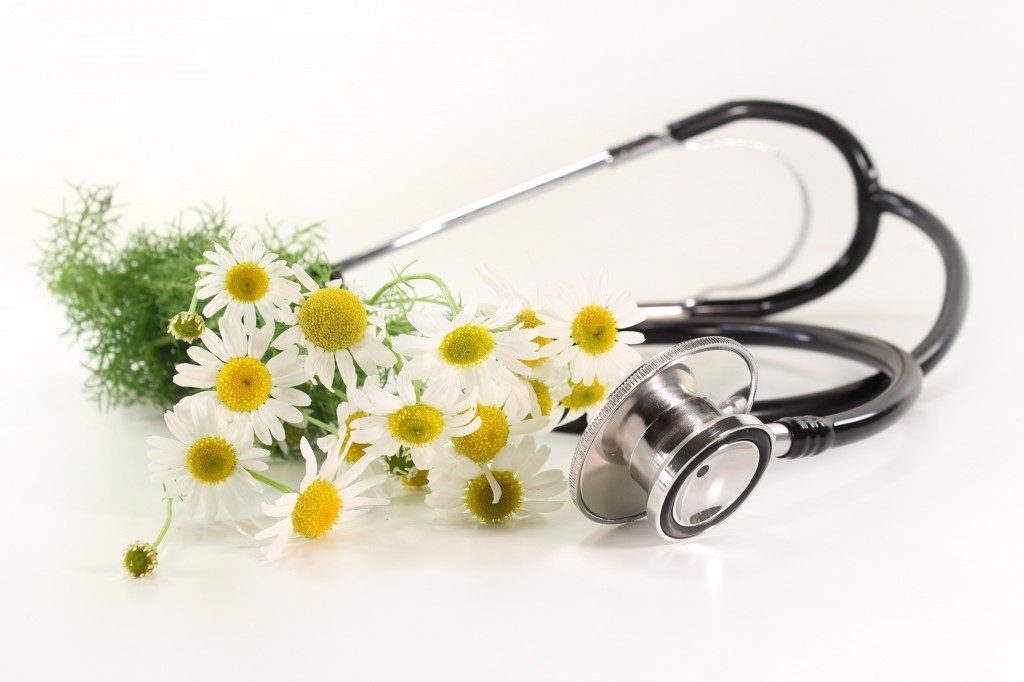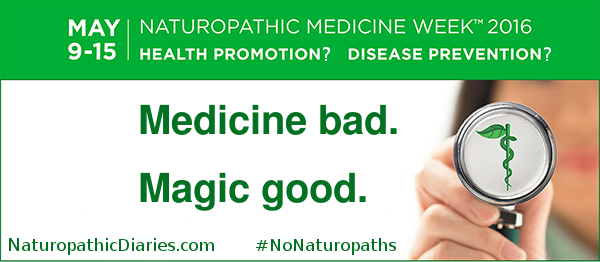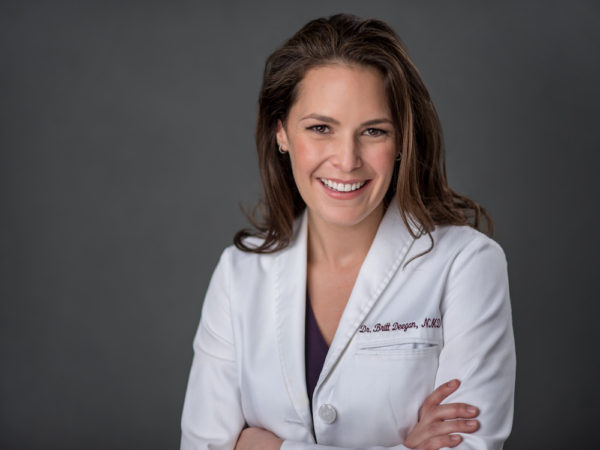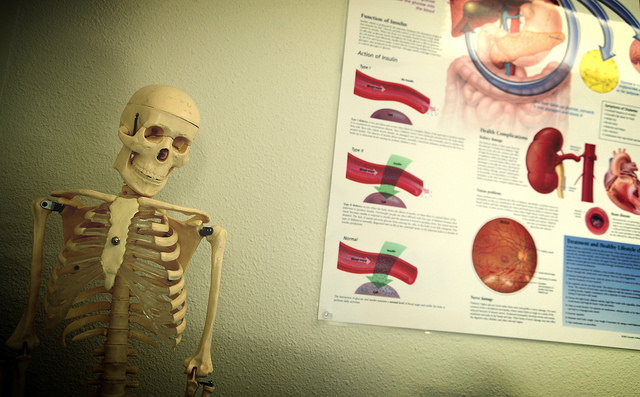
This week, May 9-15, 2016, is Naturopathic Medicine Week in Canada. Let’s celebrate by recalling some problems with this alternative system of “medicine.”
- Naturopathy is based on a pre-scientific understanding of health and disease. Naturopaths believe that a magic force, called the vis, is responsible for determining the health of the mind and body. This notion is similar to the ancient Greek concept of the “four humors” or the ancient Chinese belief in qi and meridians. It is simply magic.
- Naturopaths are not doctors or physicians. They are not trained well enough to identify actual diseases or to apply correct treatments. We should look no further than the tragic demise of the Albertan toddler, Ezekiel Stephan, after his parents treated his bacterial meningitis with do-it-yourself herbal concoctions. After his mother suspected he had meningitis, she went to a licensed naturopath, Tracey Tannis, and left with an herbal preparation of echinacea.
- Naturopaths aggressively lobby for licensure and self-regulation by sugar-coating their medical education and standards of care. (You can read more specifically about naturopathic training in pediatrics here.) I once lobbied for naturopathic medicine at the U.S. federal government during the annual lobbying event, DC FLI, in Washington, D.C. I now feel ashamed that I had taken part in this propagation of misinformation about the profession to lawmakers.
- Naturopaths use a cornucopia of pseudoscientific methods in clinical practice that have been disproven by the scientific and medical communities or not shown to be plausible. These include homeopathy, herbal medicine, dietary supplements, saliva testing, bio-identical hormone replacement, blood allergy testing, applied kinesiology, and intravenous therapies of high-dose vitamins, minerals, ozone gas, and hydrogen peroxide. They also mis-characterize any plausible mechanisms by which these treatments could work and the evidence supporting safety and effectiveness.
- No major, respected medical organization endorses naturopathic medicine. This is not because medical doctors are worried about competition. It is because they are concerned about patient safety.
Naturopathic practitioners, even though many are licensed by governments, often find themselves in legal and ethical grey zones. If you are a patient of a naturopath or know someone who is, I encourage you (or your friend or family member ) to ask for the answers to the following questions in writing:
- Is the treatment approved for [your condition] by Health Canada or the U.S. FDA?
- Who manufactures the substance or device and where?
- What are the specific indications for the treatment?
- What are the specific side effects and risks associated with the treatment?
- What evidence supports the use of the treatment?
Happy Naturopathic Medicine Week!
Feel free to share the image below on social media:





I am delighted by your conversion to real medicine. However, I find the title of your website misleading and think you would gain a far bigger audience if you veered away from a name that oozes “magic”. It took me a while to understand that you are, indeed, an anti-naturopath, and I am not a complete bonehead. On the contrary. Perhaps you might consider an alias website with a more anti-“woo” name that sends people here? Just a suggestion, because more people need to read what you have to say. Applause, by the way. Lots of applause.
What’s wrong with Naturopathic Diaries? It seems to me to be a name that would attract believers and that’s a good thing. Otherwise you are preaching to the choir and there is little point in that.
I rather enjoy hearing about the adventures of a “turncoat”, even though I sing with the choir ; )
Keep the name! It attracts the people who really need to understand the woo of the naturopath industry.
Which is terrific, but as I suggested, perhaps there could be an alias website that also directs people here. To attract those who are repelled by the mere mention of the word “naturopathic”, as I would have been had a friend not pointed out the heart of gold to be found herein…
While it would be an over-generalization to state that “herbal medicine” and dietary supplements (DS) are entirely disproven, before taking a particular DS or herbal preparation, patients might ask to see the consistency of evidence for the efficacy and safety of the same product in a given condition. But whether the majority would be able to evaluate the information—assuming the product had been subjected to well-controlled clinical trials in the treatment of the patient’s condition—is highly doubtful.
“Herbal medicine”, rather than being disproven, are already an integrated part of science-based medicine: there’s an entire field called pharmacognosy dedicated to discovering, isolating and identifying active compounds from natural sources such as plants, so that they can be used as ingredients in drug formulations.
Using the isolated active molecule itself rather than a crude herbal preparation allows multiple benefits: known and consistent dosage, elimination of contaminants, etc.
There’s a reason why we’ve abandoned drinking willow bark tea and reach for aspirin tablets when we’ve a headache, after all.
Yes, JGC. Just as compounds derived from plants and other natural sources can serve as drugs, the structures of the same active constituents have proven useful as templates in the development of finely ‘tuned’ drugs. Depending on the dosage, a crude extract of a plant such as a tea (infusion) decoction, tincture, alcohol, or other solvent extract may show greater toxicity and less specificity in the treatment of disease than an isolated constituent. Due to the presence of modifying constituents, the opposite may also be true.
I’m unaware of any plant preparation where modifying constituents found in a crude extract/infusion etc. results in improved efficacy or reduced toxicity compared to its isolated active ingredient. Could you provide an example?
I’m unaware of any plant preparation where modifying constituents found in a crude extract/infusion etc. results in improved efficacy or reduced toxicity compared to its isolated active ingredient. Could you provide an example?
Perhaps this is a tangent, but one problem with herbal medicine or “all-natural” sources in a high-population world is the burden of damage to wild habitats, or disturbing market response in the form of cruelly caged bears for their bile or near-extinction of rhinos for their horns.
Even with a tiny percentage of the 7.5 billion people in your market, fad demands (natural loofahs, Gulf redfish, a McDonald’s shrimp menu item) can quickly put unsustainable pressure on a resource. I’ve become a fan of high yield crop production techniques, promoting nutrition-sufficient eating (Soylent Red or Yellow, anyone?), and water-aware development.
Wow. They have every quack together for this online event called the cancer summit.
Wow. They have every quack together for this online event called the cancer summit.
Hi Britt, an off-topic note. NDs are harping on the equality of their education with MDs. The litmus test about equality in education is international recognition. In the academic world an ND (like an MD) is equivalent to a Master’s degree. The hierarchy is Bachelor -> Master (or MD, ND, JD) -> PhD. If you had an MD you probably would not do a Masters in Medical Life Sciences but participate in a PhD program. From what you write I think you are doing the full master’s program. Except for a complete change of fields, this is very unusual. If the degrees are not deemed equal the university decrees a few exams to take before admission to a PhD. If this is not too personal for you, it would be very interesting how Kiel evaluated your ND (if they accepted it at all) what they said and why they did so. This is could potentially also be important to rid lawmakers of the impression that NDs and MDs are on par with regard to education.